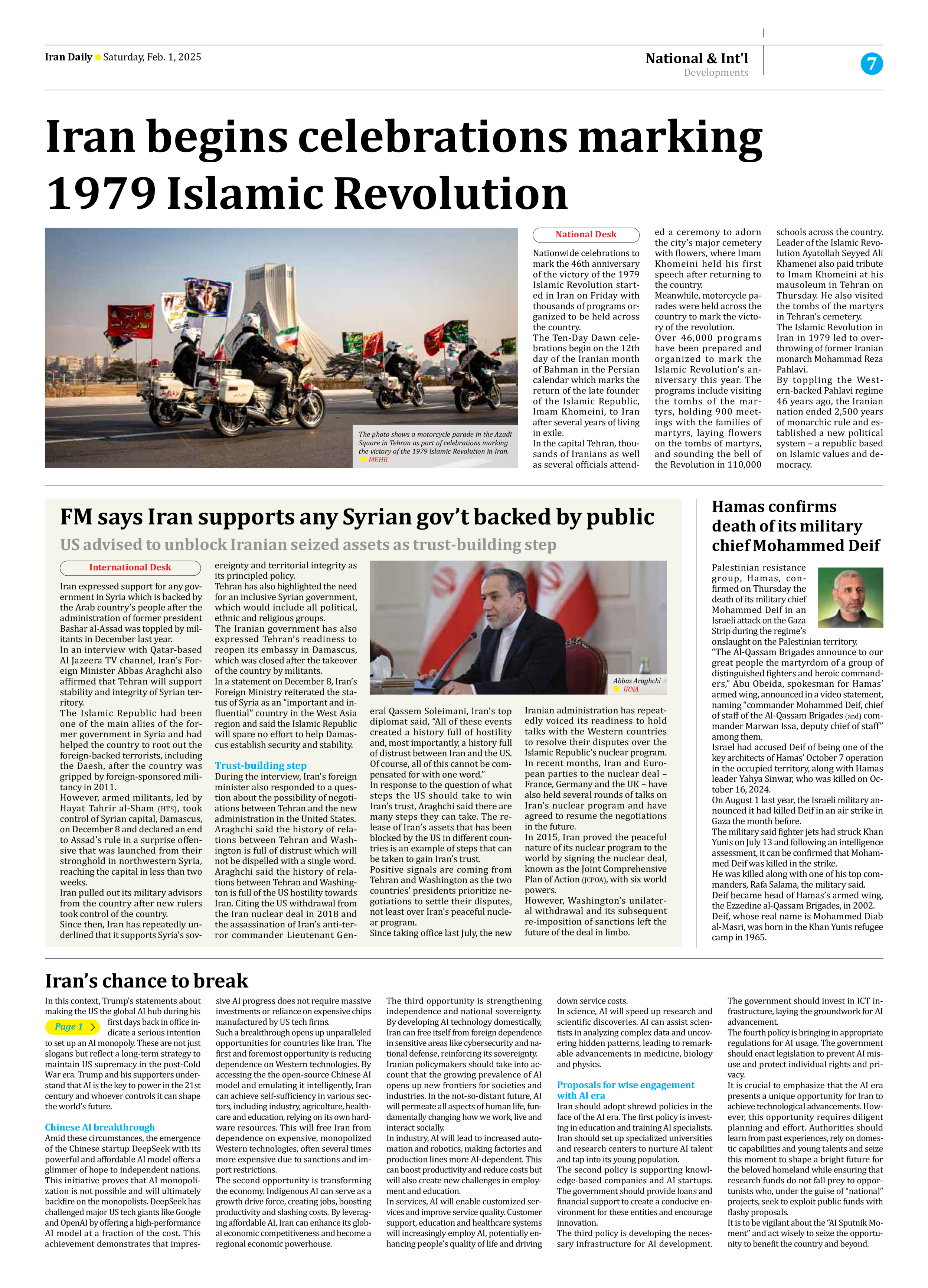
Iran’s chance to break
Page 1
In this context, Trump’s statements about making the US the global AI hub during his first days back in office indicate a serious intention to set up an AI monopoly. These are not just slogans but reflect a long-term strategy to maintain US supremacy in the post-Cold War era. Trump and his supporters understand that AI is the key to power in the 21st century and whoever controls it can shape the world’s future.
Chinese AI breakthrough
Amid these circumstances, the emergence of the Chinese startup DeepSeek with its powerful and affordable AI model offers a glimmer of hope to independent nations. This initiative proves that AI monopolization is not possible and will ultimately backfire on the monopolists. DeepSeek has challenged major US tech giants like Google and OpenAI by offering a high-performance AI model at a fraction of the cost. This achievement demonstrates that impressive AI progress does not require massive investments or reliance on expensive chips manufactured by US tech firms.
Such a breakthrough opens up unparalleled opportunities for countries like Iran. The first and foremost opportunity is reducing dependence on Western technologies. By accessing the the open-source Chinese AI model and emulating it intelligently, Iran can achieve self-sufficiency in various sectors, including industry, agriculture, healthcare and education, relying on its own hardware resources. This will free Iran from dependence on expensive, monopolized Western technologies, often several times more expensive due to sanctions and import restrictions.
The second opportunity is transforming the economy. Indigenous AI can serve as a growth drive force, creating jobs, boosting productivity and slashing costs. By leveraging affordable AI, Iran can enhance its global economic competitiveness and become a regional economic powerhouse.
The third opportunity is strengthening independence and national sovereignty. By developing AI technology domestically, Iran can free itself from foreign dependence in sensitive areas like cybersecurity and national defense, reinforcing its sovereignty.
Iranian policymakers should take into account that the growing prevalence of AI opens up new frontiers for societies and industries. In the not-so-distant future, AI will permeate all aspects of human life, fundamentally changing how we work, live and interact socially.
In industry, AI will lead to increased automation and robotics, making factories and production lines more AI-dependent. This can boost productivity and reduce costs but will also create new challenges in employment and education.
In services, AI will enable customized services and improve service quality. Customer support, education and healthcare systems will increasingly employ AI, potentially enhancing people’s quality of life and driving down service costs.
In science, AI will speed up research and scientific discoveries. AI can assist scientists in analyzing complex data and uncovering hidden patterns, leading to remarkable advancements in medicine, biology and physics.
Proposals for wise engagement with AI era
Iran should adopt shrewd policies in the face of the AI era. The first policy is investing in education and training AI specialists. Iran should set up specialized universities and research centers to nurture AI talent and tap into its young population.
The second policy is supporting knowledge-based companies and AI startups. The government should provide loans and financial support to create a conducive environment for these entities and encourage innovation.
The third policy is developing the necessary infrastructure for AI development. The government should invest in ICT infrastructure, laying the groundwork for AI advancement.
The fourth policy is bringing in appropriate regulations for AI usage. The government should enact legislation to prevent AI misuse and protect individual rights and privacy.
It is crucial to emphasize that the AI era presents a unique opportunity for Iran to achieve technological advancements. However, this opportunity requires diligent planning and effort. Authorities should learn from past experiences, rely on domestic capabilities and young talents and seize this moment to shape a bright future for the beloved homeland while ensuring that research funds do not fall prey to opportunists who, under the guise of “national” projects, seek to exploit public funds with flashy proposals.
It is to be vigilant about the “AI Sputnik Moment” and act wisely to seize the opportunity to benefit the country and beyond.







